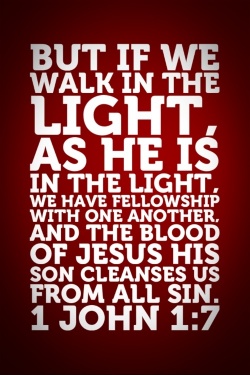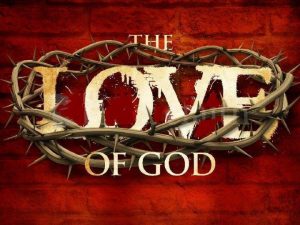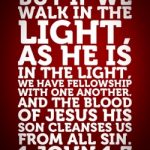One of the members of my online discipleship group recently asked me about 1 John 1:7-10 and how the blood of Jesus cleanses us from sin. Here is what he wrote:
I really appreciate your ministry and have been blessed by your books. I have a question for you regarding 1 John 1:7, where it says the blood of Jesus cleanses us from sin. I just listened to your podcast about the two different words for forgiveness, but I’m wondering how this verse plays into it all, since it uses the word “cleanses” – what do I need to know to understand this well? -Eli
Thanks for the question, Eli!
 1 John 1:7-10 does get discussed in various ways through my online course “The Gospel Dictionary,” but let me try to summarize here some of what I teach in that course. For a fuller understanding, you would need to take the lessons on Blood, Confess, Fellowship, Forgiveness, and Sin. Of course, not all of those lessons are available yet, but they will be soon… But while you wait, you can also read about forgiveness and sin in my book, (#AmazonAdLink) Nothing but the Blood of Jesus, which discusses these terms.
1 John 1:7-10 does get discussed in various ways through my online course “The Gospel Dictionary,” but let me try to summarize here some of what I teach in that course. For a fuller understanding, you would need to take the lessons on Blood, Confess, Fellowship, Forgiveness, and Sin. Of course, not all of those lessons are available yet, but they will be soon… But while you wait, you can also read about forgiveness and sin in my book, (#AmazonAdLink) Nothing but the Blood of Jesus, which discusses these terms.
So here is my basic answer for how to understand 1 John 1:7-10.
Cleansing from Sin (1 John 1:7, 9)
Let us begin by quoting the pertinent verses:
But if we walk in the light as He is in the light, we have fellowship with one another, and the blood of Jesus Christ His Son cleanses us from all sin. … If we confess our sins, He is faithful and just to forgive us our sins and to cleanse us from all unrighteousness (1 John 1:7, 9).
There are five key terms which help us understand 1 John 1:7-10. We must understand what is meant by the words “sin, blood of Jesus, confess, forgive, and cleanse.” Let us briefly consider all five.
Sin in 1 John 1:7-10
The term “sin” in 1 John does not simply refer to breaking God’s law or doing bad things. Most Christians understand the word “sin” this way, but this is not primarily the way the Bible defines sin.
In Scripture, as in 1 John, sin is primarily the activity and actions that lead to and involve accusing and scapegoating other people. Yes, John says that “sin is lawlessness” (1 John 3:4) but the laws were only given to keep us from accusing, condemning, scapegoating, and killing others in God’s name.
So lying and stealing are sinful, but only because they are part of the actions and behaviors that lead us to accuse, condemn, and scapegoat others. One premier place we see this in 1 John is when John gives the example of Cain murdering his brother Abel (Gen 4). This murder is the first sin in the Bible, and sets the stage for all sinful behavior that follows. (For a longer explanation, listen to my podcast episodes on Genesis 4.)
So sin is the ancient and universal human practice of wrongly accusing, condemning, scapegoating, and killing others in God’s name. This helps us understand what is meant by the term “the blood of Jesus.”
Blood of Jesus in 1 John 1:7-10
Few people actually believe that they engage in the practice of wrongly accusing, condemning, or scapegoating others. We believe that our judgments of others are righteous, valid, and correct. We believe that the people we accuse and condemn truly are guilty of the things we accuse them of.
 And while it is true that they might be guilty of some of the things we accuse them of, the human tendency is to amplify the sinful behavior of others so that we can turn them into monsters, and dehumanize them, so that we can condemn them, or send them into exile, or even kill them in the name of God.
And while it is true that they might be guilty of some of the things we accuse them of, the human tendency is to amplify the sinful behavior of others so that we can turn them into monsters, and dehumanize them, so that we can condemn them, or send them into exile, or even kill them in the name of God.
But few humans recognize that we do such a thing. We don’t admit that our judgments are unjust. We think we rightly accuse and condemn others.
So Jesus came along to reveal the truth to us. And though He was innocent of all wrongdoing, we accused, condemned, and killed Him … and we did this all the name of God. But since He was completely innocent, His unjust crucifixion revealed that we humans have a problem with unjustly accusing and condemning people.
The blood of Jesus reveals this truth to us. And nothing but the blood of Jesus could reveal this truth to us. Only someone who was completely innocent could show us that we humans have a problem with unjustly condemning and accusing other people.
But the sad reality is that even though Jesus revealed this truth to us, few of us recognize our involvement in such behaviors. But we must recognize it, and we must agree that we are indeed guilty of these sorts of accusatory, condemning, scapegoating practices.
Confession in 1 John 1:7-10
The word “confess” means to agree. When Jesus revealed the truth to us by His blood, we are faced with a choice.
We can either agree with what Jesus has revealed, or we can disagree. We can either confess or we can deny that we do indeed engage in falsely accusing and condemning others.
Of course, if we deny that we are involved in such practices, then we’re simply deceiving ourselves and have not yet recognized the truth.
Forgiveness in 1 John 1:7-10
But if we do agree and confess that we have been involved in falsely condemning, accusing, and scapegoating other people, it is then and only then that we can begin to break free from such practices and start loving other people as God wants and desires.
 There are two words for forgiveness in the Bible. One is freely extended by God to all people throughout time for all their sins, past, present, and future. The second is only experienced when we humans take certain actions to change our thought patterns or behavior.
There are two words for forgiveness in the Bible. One is freely extended by God to all people throughout time for all their sins, past, present, and future. The second is only experienced when we humans take certain actions to change our thought patterns or behavior.
It is this second type of forgiveness that is mentioned in 1 John 1:9. So while God has always and freely forgiven us for all our sins, we will not experience this forgiveness in our own lives unless we take some actions to see the truth about ourselves, and take steps to change our behavior.
But this change begins with agreeing or confessing that we practice sin.
Cleansing in 1 John 1:7-10
Only when we agree and confess that we do indeed engage in falsely accusing, condemning, and scapegoating other people will we begin to be cleansed from our practice of this sin in our lives.
The cleansing of our sin is not a spiritual cleansing, but is a cleansing and changing of our actual behaviors going forward. As we are cleansed in this way, we will grow in fellowship with God and with one another.
An Amplified Summary of 1 John 1:7-10
With these five terms in mind, we can now easily understand what John is saying in 1 John 1:7-10. Here is an amplified paraphrase:
1 John 1:7. God walks in the light and we can walk in the light with Him if we agree with the light of truth He has revealed. When we live in light of this, we will live in peace with God and with each other and will no longer engage in the sinful practices of accusing, condemning, scapegoating others, which was revealed to us through the blood of Jesus. When we turn from such practices, we will be cleansed from living in such violent ways.
1 John 1:8. Of course, not everybody wants to admit that they engage in such practices. We humans tend to think that our judgments of others are just, and that our accusations of them have the backing and support of God. But if we believe this way, then we are simply deceiving ourselves, and we have not yet understood the truth.
1 John 1:9. However, if we agree that we do indeed engage in the sinful practices revealed through the bloody death of Jesus on the cross, then God is faithful and just and will help us gain deliverance and freedom from our bondage and enslavement to these practices, and He will help us stop engaging in them any longer. (God has freely forgiven us of all these sins, but if we want to practically be cleansed from them, we need to admit that we engage in them, and then follow the example and teachings of Jesus in how to live with love and free forgiveness instead.)
1 John 1:10. So once again … if you deny that you engage in this basic human practice of accusing, condemning, and scapegoating others … if you think that the people you call “monsters” and “heretics” truly are guilty of everything you accuse them of … if you think that some people truly deserve to burn in hell for all eternity … if you think that war is righteous and good and we need to bomb some groups of evil people off the face of the planet … then you are calling God a liar, and you have not understood the first thing about God and what He taught through Jesus (cf. 1 John 4:7-11).
So what is John teaching in 1 John 1:7-10?
The blood of Jesus cleanses us from sin by exposing sin for what it is and then calling us to no longer live in the way of sacred violence. His blood cleanses us through calling us to practice non-violence.
 The blood of Jesus is not a spiritual antidote to sin which somehow removes the polluting presence of sin from our lives.
The blood of Jesus is not a spiritual antidote to sin which somehow removes the polluting presence of sin from our lives.
No, the blood of Jesus exposes our sacred violence to us so that we can see in our own lives how we make scapegoat victims out of others, and then calls us to no longer live in this way. Instead, we are to walk in the light of Jesus and have fellowship with Him, with God, and with one another (1 John 1:3).
Of course, as John goes on to explain, if we deny what Jesus reveals to us through His blood, and say that we are not guilty of sacred violence toward others, then we simply have not yet seen the truth about the blood of Jesus and have not owned up to our own duplicity and participation in human scapegoating and violence.
Only once we admit it and own up to our role in making victims of others can we then be cleansed from it and work in fellowship with God and others (1 John 1:8-10).
But what about our PAST sins?
While this understanding helps cleanse our life from present and future sins, how does the blood of Jesus cleanse us from past sins?
In other words, while the understanding proposed here helps us turn from our violent, sinful ways in the future, what does 1 John 1:7-10 have to say about our past sins?
The answer is that the text doesn’t say anything about our past sins. It is only concerned with our present and future behavior.
 John is primarily interested in make sure that his readers recognize how they have been involved in the violent, bloody, accusatory, scapegoating practices that run this world, and turn from such behaviors to walk in the light of God’s love.[1]
John is primarily interested in make sure that his readers recognize how they have been involved in the violent, bloody, accusatory, scapegoating practices that run this world, and turn from such behaviors to walk in the light of God’s love.[1]
Nevertheless, other passages in Scripture tell us how we are cleansed and forgiven by God from our past sins. Passages such as Romans 3:25-26, 2 Corinthians 5:19, and Colossians 2:13 reveal that God simply overlooks our sin, does not count our sin against us, and freely forgives all people of all their sin.
The instruction in 1 John 1:9 to confess our sins so that we might be forgiven is referring to a conditional type of forgiveness which is not the same thing as God’s free and unconditional forgiveness. Here in 1 John 1:7-10, the issue is not so much about being cleansed from our past sins, but about our present and future behavior as we seek to live in fellowship with God and one another.
So how are you going to live?
First of all, do you see what is revealed through the violent and bloody death of Jesus? Do you see how He revealed the truth that we humans accuse, condemn, scapegoat, and even kill other people in God’s name … but that none of this has anything to do with God, but is in fact the exact opposite of what God wants and desires?
Second, you you agree that you have engaged … and might still be engaging … in some of these practices today? Maybe you are engaging in this practice toward Muslims … or gays … or Democrats … or Republicans … or President Trump … or the Media … or your boss … or your neighbor … or … whomever.
Third, if you recognize you have engaged in some of these practices, then what are you to do about it? Well, that’s what the rest of 1 John is all about, which you can read on your own. But the bottom line is that you need to unconditionally love and freely forgive, just as God loves and forgives us.
But all of that will have to be saved for another study.
If you have questions or comments, leave them in the comment section below … and also, consider joining us in the online discipleship group where we regularly discuss these sorts of topics and passages. If you are already in the group, make sure you have signed up to take “The Gospel Dictionary” course, which is free for you to take inside the group.
Notes:
[1] The Greek word for “cleansing” in 1 John 1:7 is present indicative, and in 1 John 1:9 is aorist subjunctive. Though aorists can indicate past time, the subjunctive mood indicates probability or objective possibility. Therefore, due to the inherent contingency of the subjunctive mood, the implied timing is usually future, so that aorist subjunctive tends to have a future timing, and can even be used as a substitute with the future indicative. See https://www.ntgreek.org/learn_nt_greek/subj-detail-frame.htm




Thank you for continually simplifying the amazing message of grace, and grace alone.
Good episode… I appreciated the difference between the two types of forgiveness…
Discussion question here…
Some time back, the group I hang out with were spending a weekend together with a post-it on the wall labeled “Saved from” and “Saved To”…
As I was thinking about this, I remembered a hymn that I grew up singing… “Only a sinner saved by grace”. While this is true, I also wonder if we take on that identity and it ends up as shackles… On the paper, I wrote: “Saved from: A sinner saved by Grace”, “Saved To: A child of God”…
Here is the question… Although we continue to sin, if we are children of God, we are no longer “sinners”… I know there is a fine line, based upon John 1 but I also don’t want my identity to be Sinner…
What are your thoughts?
Sorry I missed this until now … I agree with you. Though it is good to remember where we came from, it is also helpful to realize that who we were is not the same as who we are. Now we are children of God and this identity helps us live this way as well.
You have a great explanation here about 1 John 1:7-10. But I don’t like assuming anything. Including definitions.
Question?
Could you please explain how and the source of your definition of sin in the context of this scripture, to be limited to accusing, condemning, scapegoating and killing in the name of God?
Jeremy explains it in depth in his book “Nothing but the Blood of Jesus”.
Does Jesus Christ love us even if you sin
Yes! Always and forever.
1 John 1 7-10. I agree with this profound explanation and it has helped me understand how the blood of Jesus cleanses me from all unrighteousness and the necessity of the cleansing. As stated in John 1 verses 3,4, we then have fellowship with Jesus, God and the the family of God, our brothers and sisters, then our joy may be full and non-believers may then be interested in hearing the gospel when they see Christianity lived out.
Why do people go to hell is this because they rejected the blood of Jesus Christ and if so do they get another chance to get saved by Jesus Christ the King
Well, first there is the question of hell itself … what is it (and WHEN is it)? I am writing a book on this topic. Look for it soon!
But second, people only receive eternal life when they believe in Jesus for it (John 3:16; 5:24; 6:47).
I like some of what you say but as far as I’m aware the first sin was when eve was deceived by satan and disobeyed Gods command to not eat of the tree of the knowledge of good and evil. Some people say when Lucifer became satan due to pride was the first sin but either way who’s bragging about that accomplishment(probably satan)
The sin nature that infected the entire human race because of the sin of Adam, our first forefather according to the flesh, died in Christ. If One died for all, then all died. Think of it! The whole Adamic race died in Him, and Paul said that we are to reckon it to be so. Consider, accept, reckon it to be an historical fact that your sin nature inherited from Adam died in Him.
We now have to deal with the carnal mind which continues to think according to the flesh, and which continues to reckon the sins of others against them instead of seeing them as forgiven. In condemning others, we condemn ourselves as well, but we just see ourselves as not as bad as others when we magnify their bad behaviour instead of saying, “But for the grace of God, there go I!”
Please pray for me to see His forgiveness and forgiving nature.
I was reading what you wrote about Cain murdering Able being the first sin in the Bible, I disagree with that statement. The first sin occurred in the Garden of Eden when Adam and Eve disobeyed God’s command to them to not eat of the tree of knowledge of good and evil. Sin entered the world through this one act of disobedience and because of that sin entered Cain’s heart and he murdered his brother
I understand your concept and I will say that I am guilty. But what about the sin of adultery, Jesus said if you look at a woman and desire her, you are guilty of the sin of adultery. Matthew 5:28 I believe I am cleansed from such sin, thank God for the blood, some sixty years ago when I was set free, and I am thankful I am still free, living by the grace of God.
Hello,
Your definition of sin is not only incomplete, it is scripturally inaccurate. Sin is described in the Bible as transgression of the law of God (1 John 3:4) and rebellion against God (Deuteronomy 9:7; Joshua 1:18). Sin had its beginning with Lucifer, probably the most beautiful and powerful of the angels. Not content with his position, he desired to be higher than God, and that was his downfall, the beginning of sin (Isaiah 14:12-15). Renamed Satan, he brought sin to the human race in the Garden of Eden, where he tempted Adam and Eve with the same enticement, “you shall be like God.” Genesis 3 describes Adam and Eve’s rebellion against God and against His command. Since that time, sin has been passed down through all the generations of mankind and we, Adam’s descendants, have inherited sin from him. Romans 5:12 tells us that through Adam sin entered the world, and so death was passed on to all men because “the wages of sin is death” (Romans 6:23).
We are all three times condemned due to inherited sin, imputed sin, and personal sin. The only just penalty for this sin is death (Romans 6:23), not just physical death but eternal death (Revelation 20:11-15). Thankfully, inherited sin, imputed sin, and personal sin have all been crucified on the cross of Jesus, and now by faith in Jesus Christ as the Savior “we have redemption through His blood, the forgiveness of sins, according to the riches of His grace” (Ephesians 1:7).
Azazel” or “the scapegoat” is mentioned in Leviticus 16 as part of God’s instructions to the Israelites regarding the Day of Atonement. On this day, the high priest would first offer a sacrifice for his sins and those of his household; then he would perform sacrifices for the nation. “From the Israelite community [the high priest was instructed] to take two male goats for a sin offering and a ram for a burnt offering” (v. 5). The priest brought the animals before the Lord and cast lots between the two goats – one to be a sacrifice and the other to be the scapegoat.
We are called to judge “rightly”, those inside the church.
Judgment is something that believers are commanded to do in certain ways. We are not to judge people in the sense of condemning them. The church does have the responsibility to excommunicate people for sin. Any judgment that is done, is to be done righteously.
Wether you intended to or not, your definition of sin gives the impression we should not judge. In Romans 16, we are called to judge the actions of other and in the command of Romans, remove the divisive person among us.
Thank you for taking time to read how I view scripture.
Thank you for your teaching on 1 John 1: 7-9. I found it to be very helpful. I do want to make one note: Psalm 103:12 NKJV states, “As far as the east is from the west so far has He removed our transgressions from us.” So God doesn’t simply overlook our sins, He actually removes them from us.
Thank you for a greater understanding and answer to my prayers.
Blood in ancient Hebrew, is seed, grain, corn, water. The seed is the word. Grain in Hebrew, meat, corn, Mysteries. Deut.32:2 my teachings shall ( future) drop as rain. His teachings are also Fire, his ministers Flames of fire. Spiritually. Water cleanses the soul as that is what is sick. Our flesh prophets nothing. Blood is what is the parable for his teachings. We are saved by grace, grace is Mem, water, in Hebrew an seed.
Grace is knowledge 1 Peter grace and knowledge . ,the knowledge of what Yahush messiah only was sent in the world to do, teach, mark,1:38, Luke 4.43,, His teachings were found and are on SoundCloud ( under) The Assemble of the Holy Apostles. Kent Sullivan ,head apostle washing of water by his words. Judgment is John 12:47:48.